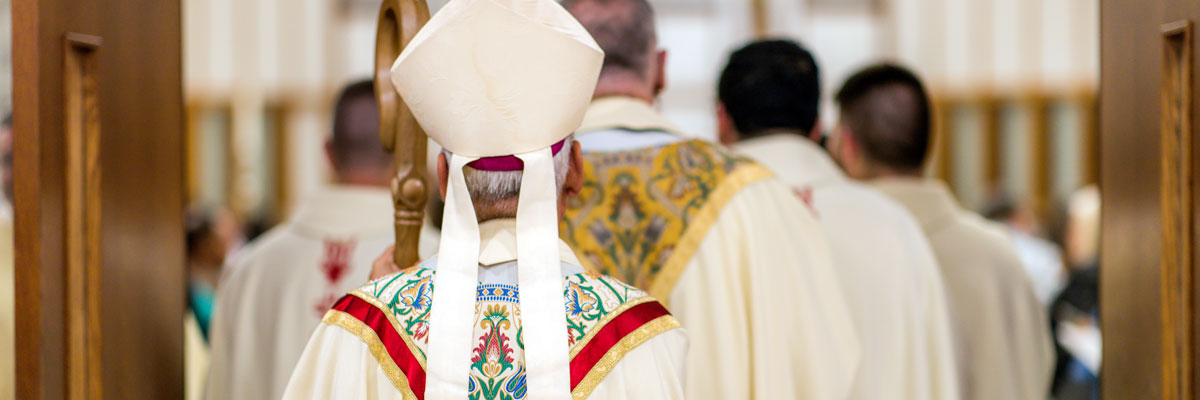Official Website of the
Catholic Diocese of Little Rock
Esther's actions saves people from death
Published: March 10, 2012
This is the 10th column in a 13-part series
By Clifford M. Yeary
Associate Director, Little Rock Scripture Study
Jesus loved to tell a good story. For 2,000 years Christians have retold his parables over and over again. No one can forget the good Samaritan, the prodigal son, or Lazarus, the poor man on the rich man's doorstep. They live in our hearts and our imagination, calling us to amend our ways and to seek a deeper intimacy with our loving God. But they are fictional characters. They never lived, except in story.
 Yet, somehow, lovers of the Bible's great stories sometimes balk at the notion that an entire book of the Bible might be a deliberate work of fiction. But such is the case for Job, Jonah and both the book and heroine that are to be the focus of our attention here: Esther. Just as with Jesus' parables in the New Testament, what is fiction in the Old Testament is divinely inspired and intended to bring deep truths in a pointed way to those who hear the tales. Esther, like any good fairy tale maiden, is a virtuous young woman of absolutely stunning beauty, but her physical charm is only a small reflection of her inner character.
Yet, somehow, lovers of the Bible's great stories sometimes balk at the notion that an entire book of the Bible might be a deliberate work of fiction. But such is the case for Job, Jonah and both the book and heroine that are to be the focus of our attention here: Esther. Just as with Jesus' parables in the New Testament, what is fiction in the Old Testament is divinely inspired and intended to bring deep truths in a pointed way to those who hear the tales. Esther, like any good fairy tale maiden, is a virtuous young woman of absolutely stunning beauty, but her physical charm is only a small reflection of her inner character.
When Ahasuerus, the most powerful emperor on earth, becomes furious with his headstrong queen Vashti, he decides to replace her. The Jewish Esther, an orphan fostered by her equally virtuous cousin, Mordecai, then becomes one of the many women of the realm from whom the king will eventually choose his new queen.
The book of Esther comes to us in two versions, with significant differences between them. The older version is written in Hebrew, and only this version is found in Jewish and Protestant Bibles. A Greek version belongs to the Catholic "Deuterocanon" and is therefore regarded by all Catholics as sacred Scripture.
The Hebrew version has something that sets it apart from all other books of the Bible: God is never mentioned. The Greek version more than makes up for this anomaly, with Esther and Mordecai revealed as people of prayer and faith. In both versions, however, God's providential care for his people is actually a primary thrust of the story.
The king, enthralled by Esther's beauty, chooses her as his queen, but he is unaware of the fact that she is Jewish. Mordecai, meanwhile, who is known to be a Jew, has disrupted a plot to assassinate the king, a valorous act that gets recorded, but which the king is ignorant of at first.
While Mordecai's good deed goes without reward, the villain of the story moves to center stage. The evil and utterly vain Haman, who has not been said to have done anything of merit, is exalted as the king's right hand man. Haman now expects every male in the realm to bow down before him and when Mordecai refuses, Haman hatches the cruelest plot imaginable.
He persuades the king to set a date on which every Jew in the empire is to be put to death. What will happen to Esther? What will happen to Mordecai? What will happen to the Jewish people? At last, Mordecai seems to recognize that there is some bigger reason behind Esther's surprising status: "Who knows — perhaps it was for a time like this that you became queen?" (Esther 4:14.)
Mordecai challenges Esther to risk her life for the sake of the Jewish people. She must go to the king and plead with him to reverse the order to slay the Jewish people. The king has already dismissed one queen (Vashti), and it is a crime punishable by death for even the queen to approach the king unbidden.
It will come as no surprise even to those unfamiliar with the book of Esther that things end well for Esther, Mordecai and the Jewish people. It ends very badly for Haman and his family and for anyone allied with him, however. More than 75,000 enemies of the Jewish people end up being slain in bloody revenge.
This is not history, however, it is story telling. And in this story the villains who attempt to destroy the Jewish people have the tables turned on them. The Jewish people, who find themselves threatened with genocide (which, tragically, does happen more than once in their history), live to see their enemies destroyed. And so the book of Esther ends with a splendid feast and the Jewish people have a marvelous story to tell every year on the feast of Purim.
Study Questions
- What are some works of fiction that have given you a deeper understanding of truth?
- How does the Greek version of Esther differ from the Hebrew version?
- Who in your life has reflected the beauty of courage?
- What might Esther communicate to the people of God as a work of fiction?
This article was originally published in Arkansas Catholic March 10, 2012. Copyright Diocese of Little Rock. All rights reserved. This article may be copied or redistributed with acknowledgement and permission of the publisher.









